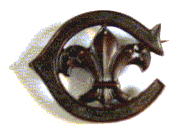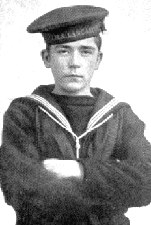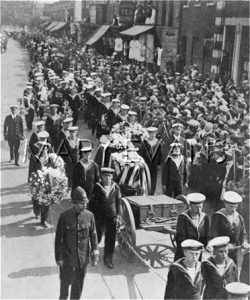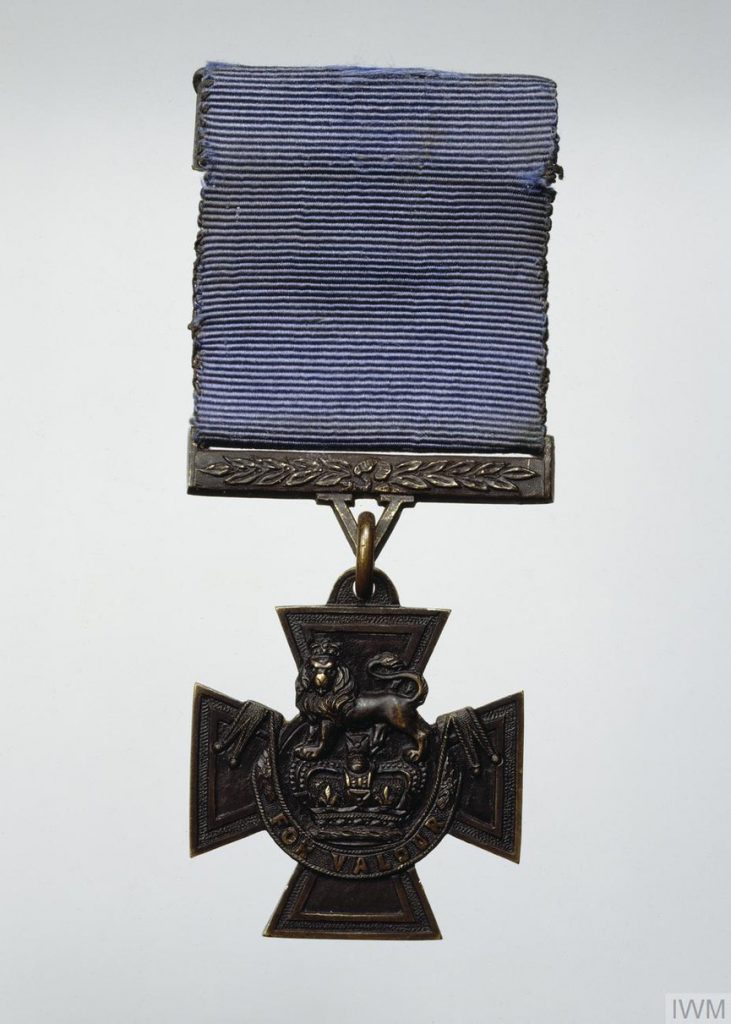
The Cornwell Award
This is an special award which is reserved exclusively for Scouts under the age of 20 and is given in respect to their courage and endurance under extreme conditions.The badge (it is not a medal) is made of bronze and features the letter “C” surrounding the Scout Fleur de Lis

The Cornwell Award is named after John Travers Cornwell who at the age of 15 gained the Victoria Cross at the battle of Jutland off the coast of Denmark where he stayed at his post of gunner on the HMS Chester.
“Jack” as he was known Cornwell was born in East London in January 1900, he was the 3rd child of Eli and Alice Cornwell. When he was old enough he joined the Scouts in the in the St Mary’s Mission, Little Ilford Troop, he left school in 1914 and became a delivery boy.
In 1915 he gave up is job and joined the navy with out his fathers permission, giving his headmaster and employer as references. He carried out his basic training at Keynham Naval Barracks at Plymouth and received further training as a Sight Setter or Gun Layer and became Boy Seaman First Class J/42563. On the Easter Monday of 1916, Cornwell left for Rosyth, Scotland to join his assignment in the navy. He was assigned to HMS Chester.
On May 31 1916 HMS Chester was in the front line in the Battle of Jutland and came under attack from 4 German Cruisers. Cornwell has serverly injured but this was not known until the ship was relived and first aid parties boarded the Chester and found him still at his post. “Jack was taken to Grimsby Hospital where he died on June 2 1916 at the age of 16. His body was returned to his family in London and buried in a communal grave in June

When the inspirational story of Cornwell’s bravery and devotion to duty was taken up by the national newspapers, the strength of public opinion led to a campaign to provide this national hero with a more fitting burial. On July 29 1916 Cornwell’s body was exhumed and taken to London to be reburied in Manor Park Cemetery with full naval honours. The funeral route was lined by Boy Scouts and attended by tremendous crowds. Jack’s family walked in the procession with 80 members of Jack’s old school, Boy Scouts, Sea Cadets, and six Boy Sailors from Jack’s ship, HMS Chester.
Three months later, captain Robert Lawson of HMS Chester described the events to the British Admiralty. Though at first reluctant, the Admiralty eventually decided to recommend Cornwell for a posthumous Victoria Cross and King George V endorsed it. The recommendation for citation from his Commanding Officer, Admiral Beatty, reads: “the instance of devotion to duty by Boy (1st Class) John Travers Cornwell who was mortally wounded early in the action, but nevertheless remained standing alone at a most exposed post, quietly awaiting orders till the end of the action, with the gun’s crew dead and wounded around him. He was under 16 years old. I regret that he has since died, but I recommend his case for special recognition in justice to his memory and as an acknowledgement of the high example set by him.”
On November 16, 1916, Cornwell’s mother received the Victoria Cross from King George V at Buckingham Palace.
A Jack Cornwell Day in the same month sought to honour his memory, while the donations that poured in to the Jack Cornwell Memorial Fund amounted to enough to pay for a new ward named in his honour, at the Star and Garter Hospital for wounded servicemen in Richmond.
After his actions at Jutland came to public attention, he was also posthumously awarded the movement’s Bronze Cross for gallantry by the Chief Scout, Robert Baden-Powell. Baden Powell then went on to created the Cornwell Award for Galantry

Below is a letter from Captain Robert Lawson of HMS Chester to Mrs Lily Cornwell, Jack’s mother:
“I know you would wish to hear of the splendid fortitude and courage shown by your boy during the action of May 31. His devotion to duty was an example for all of us.
“The wounds which resulted in his death within a short time were received in the first few minutes of the action. He remained steady at his most exposed post at the gun, waiting for orders.
“His gun would not bear on the enemy, all but two of the ten of the crew were killed or wounded, and he was the only one who was in such an exposed position.
“But he felt he might be needed – as indeed he might have been – so he stayed there, standing and waiting, under heavy fire, with just his own brave heart and God’s help to support him.
“I cannot express to you my admiration of the son you have lost from this world. No other comfort would I attempt to give to the mother of so brave a lad, but to assure her of what he was and what he did, and what an example he gave.
“I hope to place in the boys’ mess a plate with his name on and the date, and the words ‘Faithful unto death.’
“I hope some day you may be able to come and see it there.”
John Cornwell Victoria Cross National Memorial (JCVCNM) Almshouse.
The JCVCNM was established in 1928 to remember Boy Seaman John Cornwell when a plot of land was purchased at Hornchurch,, with money raised by the Mayor of East Ham., a community of cottage homes was built for needy, disabled or infirm former sailors and Royal Marines, up to and including the rank of Warrant Officer and their families. The six semi-detached houses and pathways are laid out in the form of a Victoria Cross. Since 2008, the community has been under the trusteeship of The Royal Naval Benevolent Trust.
